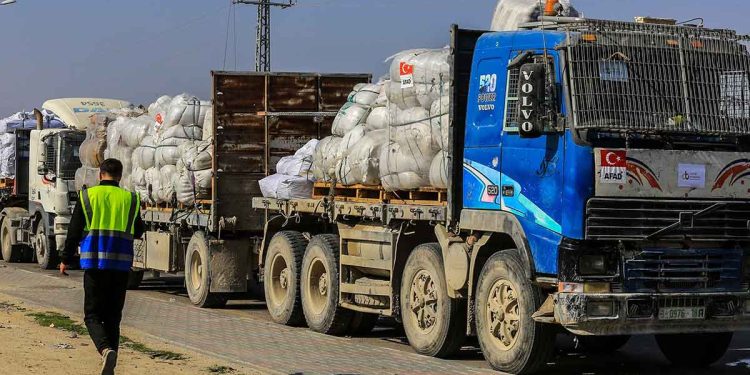The spokesperson for the UN Secretary-General, Stéphane Dujarric, stated that humanitarian aid to Gaza continues to face significant setbacks at border crossings, despite the declared ceasefire.
In a press briefing, Dujarric explained that the United Nations encountered difficulties in the flow of aid through these crossings on Tuesday, due to a decision by the Israeli occupation to reduce the volume of humanitarian assistance allowed into Gaza.
He confirmed that the UN is intensifying its communication with the Israeli authorities in order to establish a mechanism that would permit more aid to pass through a greater number of border crossings. He expressed hope that a system could be created to facilitate the increased entry of humanitarian relief into the Gaza Strip.
Recently, the Israeli occupation government informed the United Nations of its decision to halve the daily number of aid trucks permitted to enter Gaza.
Despite the ceasefire coming into effect on 10 October 2025, the humanitarian crisis in Gaza continues to worsen at an alarming rate. The strict blockade and ongoing obstruction of aid delivery by Israeli occupation forces are contributing to this escalation.
These developments occur against the backdrop of a two-year campaign of destruction launched by the Israeli occupation, with US backing, since 8 October 2023. This assault has resulted in the deaths of over 67,938 Palestinians and left around 170,169 injured, the majority of whom are women and children. Additionally, famine caused by the siege has claimed the lives of 463 Palestinians, including 157 children.
The continued restriction of aid, even under a ceasefire, demonstrates that the Israeli occupation is still employing starvation as a weapon of war, a tactic classified as a war crime under the Rome Statute of the International Criminal Court, which prohibits the deliberate deprivation of essential items required for civilian survival.
Moreover, the linking of humanitarian aid to political or military conditions constitutes a violation of the principle of humanitarian neutrality, as enshrined in international law. It also indicates a deliberate intent to commit genocide by way of siege, starvation, and the systematic denial of access to food, medicine, and water.
The catastrophic situation in Gaza underscores the urgent need for international action to enforce compliance with international humanitarian law, ensure the permanent and safe opening of crossings, and hold those responsible for atrocities against the Palestinian people accountable, classifying them as crimes of genocide and crimes against humanity.




























